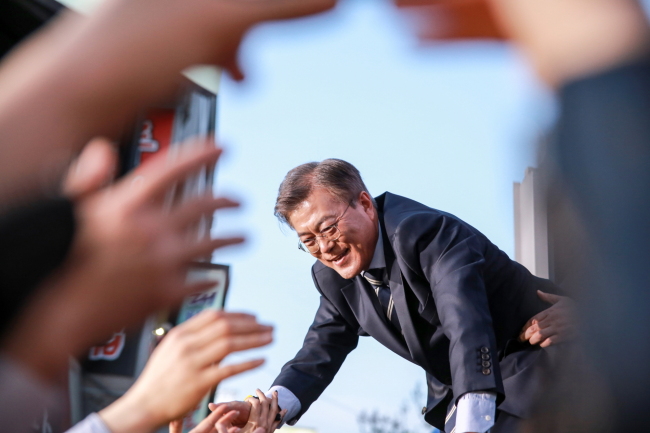North Korea policies proposed by Moon Jae-in, the front-runner in South Korea’s presidential race, may have a positive impact on the sovereign credit rating of the fourth-largest economy in Asia, said a report from Moody’s on Tuesday.
The international credit rating agency said South Korea could undergo a change in its geopolitical risks after the upcoming election that falls on Tuesday, considering Moon’s North Korea-friendly policies that have been likened to the “Sunshine Policy” of the two past liberal governments led by former Presidents Kim Dae-jung and Roh Moo-hyun.
The international credit rating agency said South Korea could undergo a change in its geopolitical risks after the upcoming election that falls on Tuesday, considering Moon’s North Korea-friendly policies that have been likened to the “Sunshine Policy” of the two past liberal governments led by former Presidents Kim Dae-jung and Roh Moo-hyun.

“More specifically, he has suggested reopening the Kaesong Industrial Complex and reconsidering the deployment of the Terminal High Altitude Area Defense system, which aims to prevent missile strikes by the North,” the report said. “Should this scenario play out and tensions ease as a result of re-engagement -- and there also be credible proof that the North has abandoned its nuclear program -- this could lead to a more positive assessment of Korea’s susceptibility to geopolitical event risk.”
However, the agency will monitor closely dependence and relations of the new South Korean president with the US and China in further assessments of the country’s credibility.
“Our base case is that tensions will continue to flare up periodically, as has been the case for decades,” it added.
Moody’s has granted South Korea an Aa2 rating with a stable outlook. It is the highest credit level among Asian economies by the global agency.
The agency forecasts Korea’s gross domestic product to grow 2.5 percent this year and 2 percent in 2018.
“We assume that spending decisions will be largely unaffected by the latest pick-up in tensions, allowing the economy to continue to expand at a relatively robust pace,” it said in the report.
However, Moody’s warned of changing perceptions of investors and consumers about conflict risks.
“Still, even in the absence of outright military conflict, a perception among investors and consumers that the risk of confrontation had increased could have negative credit implications,” it said. “Prolonged and intensifying tensions could markedly and durably dent Korea’s attractiveness as a place to invest and hire. In this case, Korea’s economic strength would erode with weaker competitiveness and lower growth. Government stimulus would have only a limited effect on such a negative structural shock, and Korea’s fiscal strength would also diminish.”
By Song Su-hyun (song@heraldcorp.com)
-
Articles by Korea Herald




![[Herald Interview] 'Amid aging population, Korea to invite more young professionals from overseas'](http://res.heraldm.com/phpwas/restmb_idxmake.php?idx=644&simg=/content/image/2024/04/24/20240424050844_0.jpg&u=20240424200058)












![[KH Explains] Korean shipbuilding stocks rally: Real growth or bubble?](http://res.heraldm.com/phpwas/restmb_idxmake.php?idx=652&simg=/content/image/2024/04/25/20240425050656_0.jpg&u=)

